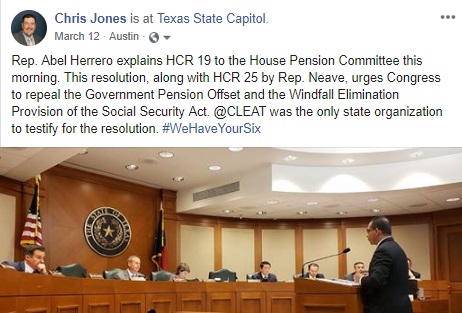

Good CLEAT bills that became Law in 2019
If you hadn’t realized yet, we were in the battle of our lives this session over a number of major issues that would have impacted your lives. Please take the time to read the Legislative Wrap-Up article for 2019.
Despite the negative climate, we were successful in passing a number of great bills for law enforcement this session.
We have two bill tracks on the CLEAT website that you can view. The “CLEAT Bill” Tracking Report shows all of the bills that we asked legislators to file for us. These are bills that were our idea. We helped draft them and provided the author with the supporting documentation and witnesses for the hearing. The “Supported Bill” Tracking Report lists all of the other bills we supported during the session. If a listed bill shows an effective date, then that bill passed and is now going to be Texas law.
A number of CLEAT bills did pass and we want to mention them here because of their significant importance:
“Contagious Disease Protection – Heart Attack and Stroke Presumption”
In 2005 the Texas legislature passed Chapter 607 of the Texas Government Code. That statute provides certain benefits for first responders that suffer illness or death in the line of duty. The law provides protections for contagious diseases and also provides workers compensation presumptions for heart attacks, strokes, and cancer. What was missing from the law was coverage for peace officers. Instead, only firefighters and EMT’s were covered.
CLEAT has been fighting for years to improve the workers’ compensation system for law enforcement officers. We have made small strides on a number of fronts. There is convincing evidence that law enforcement officers are significantly impacted physically by the job they do. Several studies have shown that officers die from heart attack and strokes and a significantly higher rate than the general population. So armed with this evidence we sought to amend Chapter 607 to include peace officers. We made the strategic decision not to ask for the cancer presumption this time around.
 In the past, if an officer died on duty from a heart attack or stroke while performing a law enforcement function, many departments would cover that death as line of duty. But if you were involved in some strenuous activity and then died the next day, or you died on duty sitting at a desk, those were not covered. By having a presumption in the law, any officer who dies or is disabled from a heart attack or stroke will be presumed to have died or been disabled in the line of duty, regardless when the heart attack or stroke happens. The only requirement under the law is that the officer would have to be screened medically and found to be clear of cardiovascular disease and would have to be on the job for 5 years or more to be covered.
In the past, if an officer died on duty from a heart attack or stroke while performing a law enforcement function, many departments would cover that death as line of duty. But if you were involved in some strenuous activity and then died the next day, or you died on duty sitting at a desk, those were not covered. By having a presumption in the law, any officer who dies or is disabled from a heart attack or stroke will be presumed to have died or been disabled in the line of duty, regardless when the heart attack or stroke happens. The only requirement under the law is that the officer would have to be screened medically and found to be clear of cardiovascular disease and would have to be on the job for 5 years or more to be covered.
SB 1582 by Senator Eddie Lucio and HB 1492 by Rep. John Wray were filed at our request. Austin cardiologist and CLEAT member Jon Sheinberg worked with us to provide expert testimony during the hearings. The worker’s compensation risk pools for both the Texas Municipal League and Texas Association of Counties fought us every step of the way. But we prevailed. SB 1582 passed and was signed by Governor Abbott. The bill will take effect on September 1, 2019.
In order to take advantage of the presumption, officers will need to have a physical examination, including a medical screening for cardiovascular disease. If that screening shows no signs of CVD and the officer has been employed for more than 5 years, then the presumption would apply if the officer were to later suffer a heart attack or stroke.

CLEAT was the only statewide organization to support this bill and we have included some related documentation below.
More Information on LEO CVD – CLEAT Interview with Dr. Sheinberg
SB 1582 Witness List (Who has your Six?)
SB 1582 Senate Hearing – Scroll to the1:00:20 mark in the video – This is worth watching from the perspective of knowing what Municipal & County Risk Pools had to say about police officers and CVD.
KXAN – May 19, 2019
Cardiologist, police lieutenant works to keep officers heart healthy
“Other Workers Compensation Issues”
For years, officers have fallen through the cracks when it comes to issues related to line of duty injuries. The worker’s comp system was designed as a “one size fits all” system for injured workers. However, we know that first responders’ propensity to injury is different than other workers; especially because first responders are called to purposefully put themselves in harm’s way in order to protect the public. Peace officers and firefighters run toward danger while others run away.
 So, we started a number of years ago to address those issues and where possible separate first responders from other workers within the system. One of the first bills to treat first responders differently was a CLEAT bill that was passed as part of the worker’s compensation Sunset bill in 2011. HB 2605 passed with an amendment by Rep. Joe Deshotel (D-Beaumont) that required public employers and workers comp insurance carriers to expedite the claims and appeals for first responders injured in the line of duty.
So, we started a number of years ago to address those issues and where possible separate first responders from other workers within the system. One of the first bills to treat first responders differently was a CLEAT bill that was passed as part of the worker’s compensation Sunset bill in 2011. HB 2605 passed with an amendment by Rep. Joe Deshotel (D-Beaumont) that required public employers and workers comp insurance carriers to expedite the claims and appeals for first responders injured in the line of duty.
We also pushed for legislation that ultimately resulted in the creation of a First Responder Liaison in the Office of Injured Employee Counsel.
So this session, not only did we work to pass, SB 1582, but we were the only state union to support SB 2551 by Senator Chuy Hinojosa (D-McAllen) and Rep. Dustin Burrows (R-Lubbock).
The bill puts teeth into the worker’s compensation law with regards to violations that affect first responders. The bill provides that sovereign immunity no longer applies to sanctions and administrative penalties assessed against cities and counties for violation of workers compensation rules. And it would allow an employee to recover attorney’s fees from a public employer who is involved in a lawsuit over workers compensation coverage or benefits.
The bill passed and was signed by Governor Abbott on June 10, 2019, and took effect immediately.
CLEAT was the only statewide law enforcement organization to support and testify for this bill. SB 2551 Witness Lists: House Senate
“Tuition Exemption for Disabled Peace Officers”
HB 766 was filed by Rep. Dan Huberty (R-Houston) at CLEAT’s request in 2017 and again this year. Senator Kirk Watson (D-Austin) was the Senate sponsor of the bill.
HB 766 provides that officers who are permanently disabled in the line of duty are entitled to a mandatory tuition exemption from state college and universities in order to learn a new profession. The bill passed and took immediate effect when it was signed by the Governor on June 14, 2019.
CLEAT again was the only statewide organization to support or testify for this bill.
HB 766 Witness List
“Line of Duty Death Benefits”
CLEAT asked legislators to file two bills that would improve line of duty death benefits for officers this session.
HB 872 – CLEAT asked Rep. Cole Hefner (R-Mt. Pleasant) to file HB 872. Senator Pete Flores (R-Pleasanton) carried the bill in Senate. The bill sought to fix a loophole in the law that provides a line of duty death annuity payment to families of peace officers and state correctional officers who die in the line of duty. The law did not include county jailers or other detention officers, so this bill added them.
Rep. Abel Herrero (D-Corpus Christi) offered a floor amendment to HB 872 to fix a problem that he was addressing in another bill that he had filed for CLEAT. The amendment related to how claims are filed by agencies with the Employees Retirement System of Texas. Some agencies were refusing to file claims and this would correct that. The bill passed and was signed by the Governor. It takes effect on September 1, 2019.
HB 872 Witness List Senate
HB 3635 – CLEAT asked Rep. John Turner (D-Dallas) to file HB 3635. The bill addressed the amount of the state line of duty death benefit and how the amount of the benefit would be increased in the future. The current death benefit is $500,000, but in 2001 it was only $50,000. CLEAT was instrumental in raising this amount to $250,000 and then to $500,000, but each effort required that separate bills be filed and debated by the legislature.
Federal line of duty death benefits are based on annual increases determined by the cost of living. HB 3635 sought to do the same thing for the state benefit. The amount of the death benefit would be automatically increased in the future based on the consumer price index for Urban Consumers. When the CPI goes up, the benefit would be increased by the same percentage.
Senator Bryan Hughes (R-Mineola) was the Senate sponsor of HB 3635.
The bill passed and was signed by the Governor with an effective date of September 1, 2019.
CLEAT, again, was the only statewide organization to testify in support of this bill.
HB 3635 Witness List
“Social Security Pension Offset (GPO), Windfall Elimination Provision (WEP)”
One of the biggest complaints we hear from members who retire is the fact that their social security benefits are reduced because they were a member of a defined benefit pension and they did not pay into social security while participating in their pension plan. In most cases, these officers have earned social security through other employment, either extra jobs or through employment before or after their law enforcement career. Yet, their benefits are still reduced.
 This is something that can’t be fixed in the Texas Legislature. It has to be fixed by Congress in Washington. What the Texas Legislature can do is pass a resolution expressing their wish that Congress take corrective action. Rep. Abel Herrero (D-Corpus Christi) and Senator Joan Huffman (R-Houston) filed separate resolutions urging Congress to repeal the GPO and WEP provisions in social security.
This is something that can’t be fixed in the Texas Legislature. It has to be fixed by Congress in Washington. What the Texas Legislature can do is pass a resolution expressing their wish that Congress take corrective action. Rep. Abel Herrero (D-Corpus Christi) and Senator Joan Huffman (R-Houston) filed separate resolutions urging Congress to repeal the GPO and WEP provisions in social security.
Because this issue affects so many of our members who retire after a career of faithful service, we felt strongly about making sure this resolution passed. We worked with Reprehensive Herrero on HCR 19 and CLEAT was the only law enforcement organization to testify in support during the committee hearing. In fact, CLEAT was the only statewide law enforcement organization to support this resolution, period.
HCR 19 was passed and signed by the Governor. It sends a strong message to the U.S. Congress regarding the need to correct this long term inequity.
HCR 19 Witness List SCR 5 Witness List
“Retiree License to Carry (LTC) Bill”
Last session, CLEAT was instrumental in passing a fee waiver for active peace officers to obtain a LTC (license to carry). A CLEAT supported an amendment to SB 16 removed the $25 fee in existence at the time for officers and county jailer, and a Senate amendment to HB 3784, added at CLEAT’s request, made it clear that officers did not have to take the LTC course or firearms qualification to obtain an LTC. The purpose of these changes was to make it effortless for officers to obtain a LTC, not because they needed one to carry a handgun, but because federal law only exempts people from the background check required when buying a firearm if they have a LTC.
 Since officers were exempt, it only seemed fair that once that same officer was honorably retired, they should be exempt because of their lifetime of service.
Since officers were exempt, it only seemed fair that once that same officer was honorably retired, they should be exempt because of their lifetime of service.
We also realized that what was missed during the last session was any provision for retired officers to retain an LTC they obtained while an active officer. Upon retirement, the active officer was no longer exempt from the training and proficiency requirements that active officers had. So if they sought to renew their LTC, they would have to go through LTC training if they had not gone through it before, even though they had far more training as an officer. They would also have to demonstrate firearms proficiency required for an LTC, even though they were demonstrating proficiency to obtain credentials under LEOSA to carry a firearm as a retiree.
Because of these considerations, we asked Rep. DeWayne Burns (R-Cleburne) to file HB 2137. The bill waives the fee for honorably retired peace officers to obtain a LTC and also waives the training requirements. It waives the firearm proficiency requirements if the officer has demonstrated proficiency under Section 1701.357, Occupations Code (TCOLE firearms proficiency requirement).
The bill was carried in the Senate by Senator Pete Flores (R-Pleasanton).
The bill passed and will be effective on September 1, 2019, after being signed by the Governor.
HB 2137 Witness Lists: House Senate
Latest News
View AllCursory Summary: COVID-19 Presumption Defunding Bills Retiree Qualification Vehicle E-Tag Reform Bills TCOLE Sunset 16997
IMMEDIATE ACTION NEEDED for HB 1550 (TCOLE Sunset Bill)! We need your help, TODAY! Please take the time out of your busy day to call your Texas State Representative and tell them you OPPOSE HB 1550.HB 1550 is scheduled for floor…



